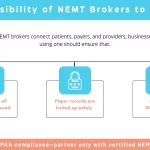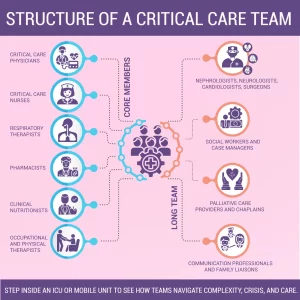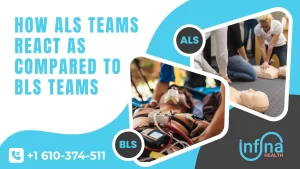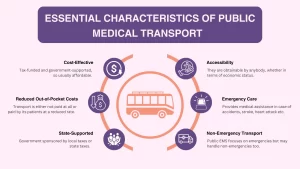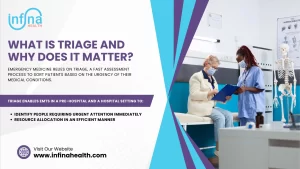Top 5 Reasons Why Hospitals Are Prioritizing BLS Training in Philadelphia for All Healthcare Workers
BLS training has become an important part of healthcare worker education across the United States, including in Philadelphia. Hospitals in the city are increasingly prioritizing BLS certification for all healthcare staff, from doctors and nurses to administrative and support staff. This is due to the fundamental importance of basic life support transportation in saving lives, improving patient outcomes, and ensuring the safety of both healthcare workers and patients in emergency situations. This blog will look into the top five reasons why BLS training in Philadelphia is now a top priority for healthcare workers.
Why BLS Training in Philadelphia Has Become Important
In recent years, Basic Life Support training has gained significant traction within healthcare settings across the United States, and Philadelphia is no exception. As the fifth-largest city in the U.S., with a population of over 1.5 million people, Philadelphia is home to numerous healthcare facilities, including large hospitals, specialized clinics, and urgent care centers. With such a diverse and dense population, medical emergencies are a frequent occurrence, requiring swift and effective intervention to save lives.
In particular, BLS training, which includes life-saving skills such as Cardiopulmonary Resuscitation (CPR), airway management, and the use of defibrillators, has become a crucial aspect of healthcare worker education. Hospitals in Philadelphia are increasingly prioritizing BLS training certificate for all healthcare staff, from medical professionals like doctors and nurses to administrative and support staff. This trend is driven by the growing recognition that quick and efficient responses to emergencies are essential in improving patient survival rates and ensuring optimal care during critical situations.
BLS training in Philadelphia is not only a response to medical needs but also a part of broader efforts to comply with healthcare regulations, minimize legal risks, nurture teamwork, and promote a culture of safety. As the medical field in Philadelphia continues to evolve, it has become clear that basic life support training is not a luxury, but a necessity for healthcare workers across the city.

Female and male trained medical personnel practicing BLS techniques during a training session, demonstrating CPR and emergency response procedures.
Why Should Hospitals Prioritize BLS Training in Philadelphia?
Below, let’s discuss the top five reasons why hospitals in Philadelphia are prioritizing BLS training for all healthcare workers.
1. Improved Patient Survival Rates During Cardiac Arrest and Emergencies
Cardiac arrest is one of the most common and life-threatening emergencies that occur in hospitals and healthcare settings. In fact, out-of-hospital cardiac arrests occur in Philadelphia at a rate of approximately 6,000 per year, with survival rates significantly influenced by the speed and effectiveness of early intervention. BLS, which includes CPR (Cardiopulmonary Resuscitation), airway management, and defibrillation, plays a pivotal role in saving the lives of patients experiencing cardiac arrest.
In hospitals, every second counts when a patient’s heart stops beating. BLS training equips healthcare workers with the skills to recognize signs of cardiac arrest quickly and administer life-saving interventions immediately. It is particularly crucial for non-medical healthcare staff, such as administrative workers, security personnel, and support staff, who may be the first responders in some cases. By ensuring that every hospital worker is BLS certified, hospitals in Philadelphia can drastically improve their patients’ chances of survival during medical emergencies.
Impact on Survival Rates:
- Immediate CPR can increase the chances of survival from cardiac arrest by up to 300%.
- Defibrillation within minutes can increase survival rates by as much as 70% in certain cases.
2. Compliance with Regulations and Accreditation Standards
Healthcare facilities in Philadelphia, like those across the U.S., are required to comply with various regulations and accreditation standards set by regulatory bodies such as the Joint Commission (JCAHO) and OSHA (Occupational Safety and Health Administration). These organizations mandate that hospitals ensure their staff is adequately trained in life-saving skills, including BLS, to guarantee patient safety and quality of care.
The Joint Commission, for example, requires hospitals to have a comprehensive emergency management plan that includes provisions for life-saving interventions. Having BLS-trained personnel on staff helps hospitals meet these standards, ensuring compliance and maintaining accreditation. Regular certification in BLS also ensures that healthcare providers stay updated on the latest techniques and guidelines, which is essential for delivering the best care possible.
Key Regulations:
- The Joint Commission mandates that hospitals provide life-saving training to all staff members in critical care areas.
- OSHA requires healthcare facilities to maintain a safe environment, including emergency preparedness training.
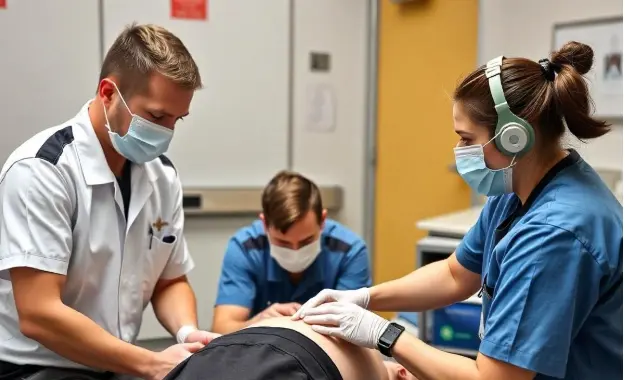
For hospitals, meeting these accreditation requirements not only ensures compliance but also enhances their reputation as a top-tier healthcare provider. With rising competition in the healthcare sector, particularly in large metropolitan areas like Philadelphia, hospitals that prioritize BLS training demonstrate a strong commitment to quality care.
A female and two male healthcare professionals receiving BLS training, learning CPR and life-saving procedures in a hands-on instructional setting.
3. Reduced Risk of Medical Liability and Lawsuits
The healthcare industry is notorious for its high-risk environment, with malpractice lawsuits and medical liability a constant concern. BLS certification reduces the risk of medical errors during emergencies and minimizes the likelihood of adverse outcomes. In situations where rapid intervention is necessary, such as a cardiac arrest or respiratory distress, having a basic life support healthcare provider on hand is a preventive measure that can mitigate legal risks.
Without proper BLS training, healthcare workers may not know how to handle life-threatening situations correctly, which can lead to poor patient outcomes and potential legal action. Conversely, hospitals that ensure all staff members are trained in basic life support demonstrate a proactive approach to patient safety. This commitment to patient care can help prevent lawsuits, as well-trained staff can provide the appropriate care during critical situations, reducing the chances of negligence claims.
Legal Implications:
- Healthcare facilities can be held liable for failing to train staff in life-saving techniques.
- BLS training helps reduce human error, which is often a cause of medical malpractice suits.
In Philadelphia, where the medical malpractice environment is highly litigious, hospitals have a vested interest in minimizing their exposure to lawsuits. BLS training thus serves as a form of risk management, protecting both healthcare workers and the institution from potential legal ramifications.
4. Enhanced Team Collaboration and Confidence in Emergency Situations
Healthcare environments, especially in busy hospitals, often involve fast-paced, high-stress situations where coordination between various team members is critical to patient care. BLS training promotes teamwork and communication among hospital staff, ensuring that everyone is on the same page when responding to a medical emergency.
Basic life support courses often simulate emergency scenarios, allowing participants to practice working together to deliver optimal care in real-life situations. Whether it’s a code blue situation (a hospital emergency code for cardiac arrest) or a respiratory distress event, having all healthcare workers on the same level of training can significantly enhance team coordination. With clearly defined roles and shared knowledge, the response time improves, which ultimately leads to better patient outcomes.
In addition, BLS training provides healthcare workers with the confidence to act in high-pressure situations. Knowing that they have the training to respond effectively can make a significant difference in reducing anxiety and hesitation when emergencies arise. This confidence can prevent delays in treatment, which is critical when every minute counts in saving a patient’s life.
Benefits of Team Collaboration:
- Better communication during high-stress situations improves response times.
- Everyone knows their role in an emergency scenario, leading to more efficient interventions.
Hospitals in Philadelphia, especially those with large teams, are recognizing the importance of fostering collaboration in medical emergencies. BLS training contributes to a well-oiled, efficient healthcare team that is ready to act swiftly and effectively.
5. Promoting a Culture of Safety and Responsibility
Prioritizing basic life support training reflects a broader commitment to patient safety and a hospital’s overall culture of responsibility. Healthcare organizations that invest in regular BLS training demonstrate that patient safety is their top priority. By equipping all staff members with essential life-saving skills, hospitals create an environment where patient care is seen as a shared responsibility among all personnel, not just doctors and nurses.
Moreover, BLS training can reduce workplace injuries, not only for patients but also for healthcare workers themselves. In high-stress environments like hospitals, healthcare workers are frequently exposed to situations where physical strain or emotional stress can lead to accidents or health issues. Training staff to handle emergency situations with composure and confidence reduces the likelihood of injuries related to panic or improper techniques.
Creating a safety-first culture is especially important in a city like Philadelphia, which has a dense population and a diverse healthcare landscape. Ensuring that everyone, from the janitorial staff to the physicians, understands their role in patient care helps foster an environment of mutual respect and accountability. This, in turn, contributes to better morale, reduced stress levels, and improved overall care for patients.
Safety Culture Benefits:
- Reduces workplace injuries and enhances staff well-being.
- Increases staff morale and job satisfaction.
Hospitals that embrace BLS training send a clear message that they are dedicated to the safety and well-being of both their patients and their employees. This cultural commitment is particularly important in hospitals that strive to maintain a positive reputation and high levels of employee retention.
Conclusion
In Philadelphia, hospitals are prioritizing Basic Life Support training for all healthcare workers due to its undeniable impact on patient care, regulatory compliance, risk management, teamwork, and safety culture. Whether it’s improving survival rates in medical emergencies, meeting regulatory standards, reducing legal risks, fostering teamwork, or promoting a culture of safety, BLS training is an essential component of a well-functioning healthcare system.
At Infina Health, we understand the critical importance of BLS training in providing exceptional patient care. Our entire team is BLS-certified, ensuring that we are fully equipped to respond to any medical emergency with the highest level of expertise and confidence. Whether you are looking to certify your healthcare team or seeking more information about how BLS training in Philadelphia can benefit your facility, we are here to help.
Contact us today to learn more about our BLS training programs and how we can help enhance the safety and preparedness of your healthcare team.
Call Now!Trusted by Our Customers
I can’t thank Infina Health enough for the incredible service they provided in transporting my mother. The ease, comfort, and professionalism they offered made all the difference during a challenging time.
Emily Johnson Daughter & CaregiverInfina Health has taken so much stress out of our daily routine. Their personalized care and reliability have made all the difference for our son and our family.
Megan R Parent of a child with autismI never realized how much stress I was carrying until Infina Health took care of the logistics. They made a world of difference in getting me to my appointments on time and in comfort.
Sarah MInfina Health turned what could have been a stressful experience into one of the easiest and most comfortable rides I’ve ever had. They truly care about their customers
James RGetting to medical appointments is just as important as the care you receive. Infina Health made that part of our journey much easier and more comfortable.
John D
